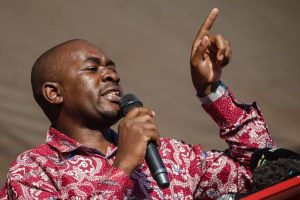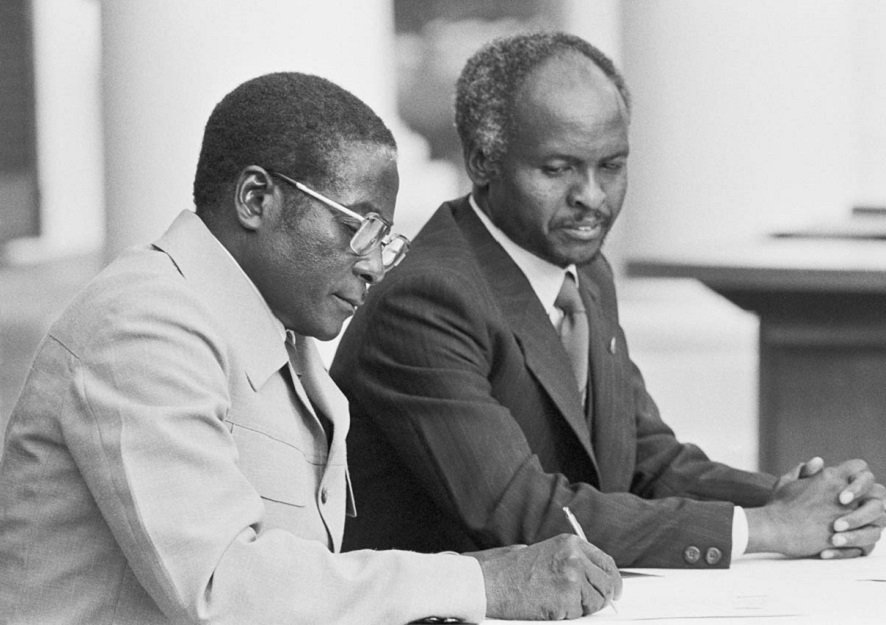Like in the resettlements, institutions are often hybrids, combining ‘traditional’ (such as chiefs and headmen) and ‘modern’ (such as village committees and councillors). In the communal areas, party officials and war veterans are less of a feature, although very often party structures have melded with other arrangements; something that is also happening in the resettlements twenty years on.
Informal institutions: the social fabric of rural life
These officially-recognised institutions may however not be the most important. In fact, churches were often referred to as the most important institution, providing support in various ways. Across our sites, the presence of evangelical churches is noticeable. In Mwenezi, the top two churches attended by households in our sample were the Zionist church and Joanne Masowe’s apostolic church, although two-thirds of households said they were not affiliated to any church. Only in Gutu were the Methodists (Gutu West) and the Catholics (Gutu North) ranked as the most important church, above the Zionist and Zaoga churches.
Outside Mwenezi, nearly 80% of households were linked to a church. The Catholics and Methodists have had long traditions of supporting education in the Gutu sites, which is evident in the engagement with schooling both of previous and current generations, including both men and women. Evangelical churches by contrast emphasise church-based solidarity, including giving and sharing funds raised for the church. Such churches do not frown on polygamy, and there are few progressive views on gender rights shown in most evangelical churches, with women taking on particular, subservient roles.
When asked about leadership positions of both senior men and women in our sample, it was links to churches – as pastors, deacons, preachers, as well as church secretaries, treasurers and so on – that were pointed to. Church leadership positions were the most significant among men for the approximately 15% of male household heads who identified themselves as leaders in some way. These roles came second to involvement in village committees, both traditional and modern, as well as burial societies in Gutu North.
For women, churches were important, and women often took on administrative roles. Indeed, for approximately 10% of women who were identified as having leadership positions, the role of secretary or treasurer of committees (for gardens, burials, churches, as well as a range of projects) was the most commonly named role.
These roles linked to projects of various sorts, some supported by churches, others by NGOs, are an important feature of communal area life, linking people outside the immediate kin network. This may result in support ranging from loaning of draft power, sharing of ideas or links to markets. Traditional group based activities, such as work parties (humwe) for tillage, weeding or other activities, persist in Mwenezi and Chivi in particular, and were identified as happening for 34% and 13% of households in 2016-17. They are less common in the Gutu sites (7% and 3%), where a more individualised culture has emerged.
Where is the state?
Links to the state and external projects are also an important feature in the communal areas. Despite the decline in state capacity between 52% and 53% of households had engaged with an extension worker in the previous year. Most of these were agricultural extension officers from Agritex, but also there were mentions of seeing state veterinarians too. Across our sites, between 13% and 26% of household heads had gained a ‘Master Farmer’ certificate (see earlier blog), and so had participated in a rigorous training course on agriculture. Some of these qualifications were gained years ago, but the continued presence of state actors in the communal areas is a feature of life. The Agritex extension worker, even if there is no fuel in his or her motorbike, is known.
In Mwenezi, around two-thirds of households were recipients of state handouts through the Presidential Scheme, mostly seed and fertiliser. This however was absent in the other sites in 2017, although of course state handouts increased in the run-up to the election the following year. Outside Mwenezi and Gutu North engagement in other projects was not a big feature, as NGOs working in the communal areas concentrate activities and miss out huge areas. In Mwenezi, project links were around a donor-supported irrigation project and a contracting scheme for sorghum led by the brewing firm, Delta.
Compared to the land reform resettlements, the communal areas are much more connected to state- and NGO-led development. There are projects, demonstrations, events, and the infrastructure of these areas, the inheritance of the 1980s in particular, including schools, clinics and government offices, demonstrates state presence, even if the buildings are decrepit and the staff poorly paid. In the resettlement areas, such investment has not happened since land reform, and the developmental state very often feels very distant. Instead, in the resettlements, much more present is the ruling part (ZANU-PF)y, alongside the war veterans who led the land invasions from 2000.
In the early days, the politics were intense, with ‘seven member committees’ installed to protect the land reform gains, mirroring structures from the liberation war. This has subsided since, as the administrative state has attempted to establish structures for development, and allowed ‘traditional’ authorities to claim control. But without state resources and personnel, and with no donor or NGO projects due to on-going ‘sanctions’ (or ‘restricted measures’ if you prefer), the dynamics are different, and tensions frequently arise between the different forms of authority, which since the imposition of the VIDCOs in the 1980s, has not been a feature of communal area life.
Institutions and agriculture: comparisons with the resettlement areas
How does all this affect land and agriculture? In the communal areas, well-established systems exist, involving both headmen and village committees, who allocate land, help resolve disputes and often assist with marketing, the delivery of state or NGO relief handouts and the negotiation projects with external actors. This system is evolving in the resettlements, but the creation of a sense of ‘community’ – essentially emerging from scratch – with established trusted relations at the centre, takes time. In the resettlements, more individual arrangements for supporting agriculture, notably around marketing, tend to emerge, reflecting the more individualised, entrepreneurial culture in the resettlement areas.
The difference in social and political relations – and associated institutions – has important gender implications. In the communal areas, women are widely involved across institutions, more usually in supporting roles, but nevertheless important ones. Women’s involvement in churches, including in leadership positions, is significant. Women are also central to projects and development activities in all of our communal area sites. This partly reflects the absence of men in the communal areas, who may be migrating for work, but also the increasing openness of what is still a highly patriarchal society. In the resettlements, while land reform offered opportunities for some women, notably those cast out of tight kin-based communal area settings because of divorce, accusations of witchcraft and so on, roles in most resettlement areas remain very circumscribed, and men, who are more present, take the lead.
Thinking about institutions, formal and informal, is central to rural development and building more sustainable livelihoods. Too often this dimension is forgotten in the rush to address technical and economic questions. But whether it’s land, production, market or service provision (the subject of the next blog), social relations are key.
This post is the seventh in a series of nine and was written by Ian Scoones and first appeared on Zimbabweland.
This field research was led by Felix Murimbarimba and Jacob Mahenehene. Data entry was undertaken by Tafadzwa Mavedzenge
Post published in: Featured










 Jordan Rothman is a partner of
Jordan Rothman is a partner of 







